Business Law Report: Analysis of Agricultural Experiment Centre UK
VerifiedAdded on 2020/01/07
|11
|3308
|112
Report
AI Summary
This report provides a comprehensive overview of business law, focusing on the UK legal framework. It begins by exploring different legal sources, the role of government in lawmaking, and the stages involved in bill creation, as well as the role of lobbyists. The report then differentiates between self-employed and employed individuals, outlining the duties of employers and the impact of employment decisions on businesses. It further examines various types of business organizations in the UK, with a detailed analysis of registered companies, specifically public limited companies (PLCs). The report also evaluates the best business model for an agricultural experiment center within a PLC structure, considering its advantages and disadvantages, and concludes with a discussion on alternative dispute resolution methods, particularly arbitration, and obtaining legal advice. This report is a valuable resource for understanding the complexities of business law and its practical implications.
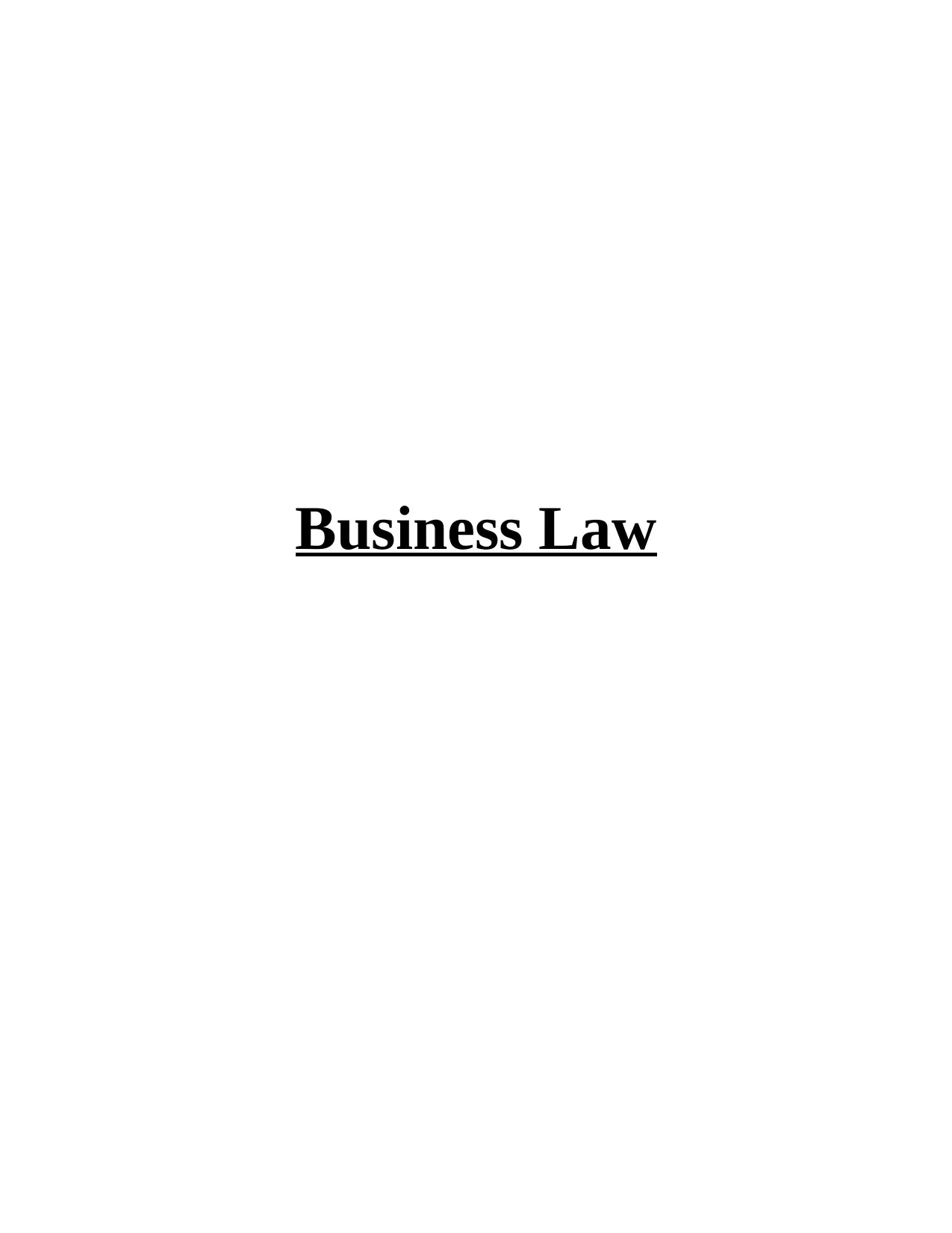
Business Law
Paraphrase This Document
Need a fresh take? Get an instant paraphrase of this document with our AI Paraphraser
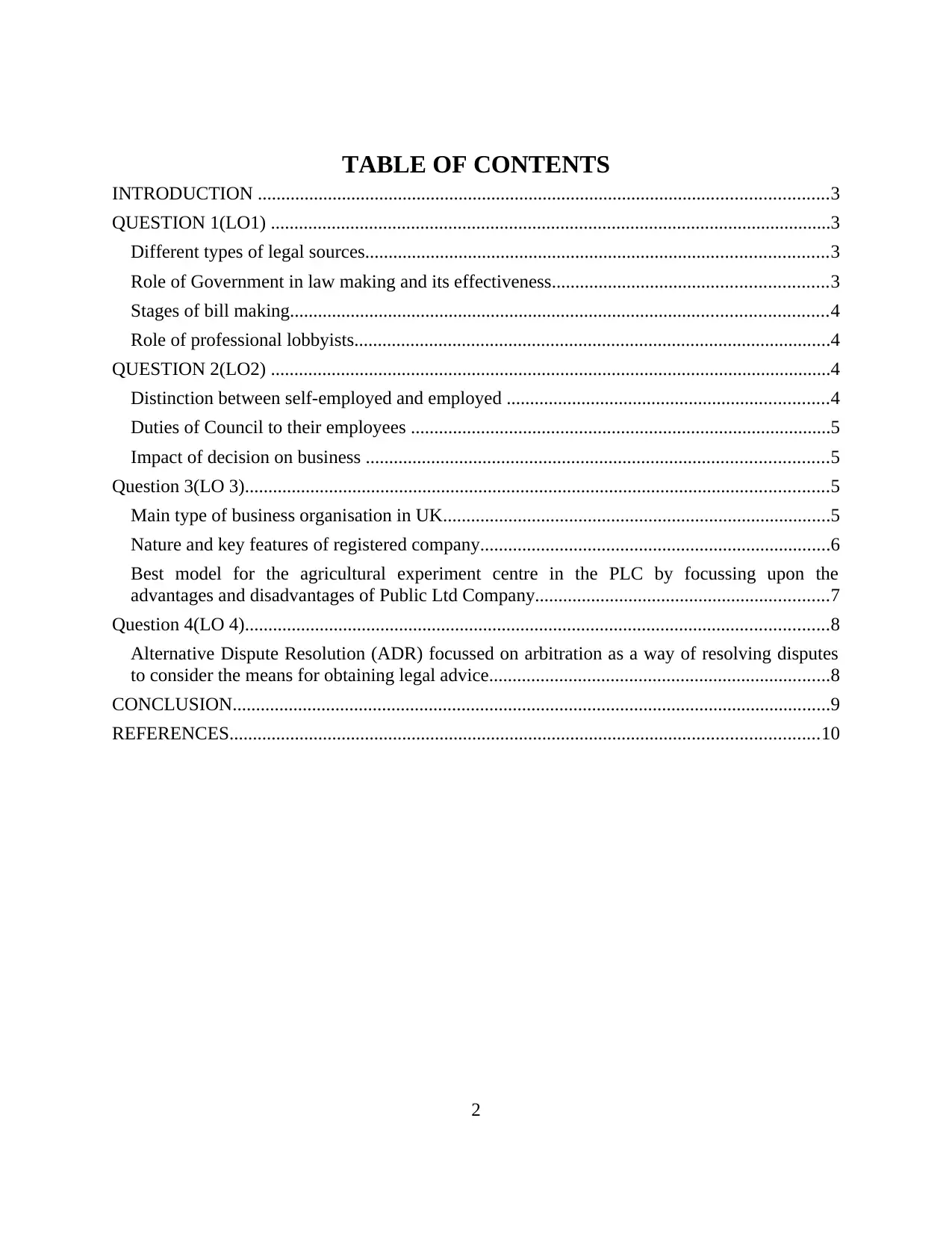
TABLE OF CONTENTS
INTRODUCTION ..........................................................................................................................3
QUESTION 1(LO1) ........................................................................................................................3
Different types of legal sources...................................................................................................3
Role of Government in law making and its effectiveness...........................................................3
Stages of bill making...................................................................................................................4
Role of professional lobbyists......................................................................................................4
QUESTION 2(LO2) ........................................................................................................................4
Distinction between self-employed and employed .....................................................................4
Duties of Council to their employees ..........................................................................................5
Impact of decision on business ...................................................................................................5
Question 3(LO 3).............................................................................................................................5
Main type of business organisation in UK...................................................................................5
Nature and key features of registered company...........................................................................6
Best model for the agricultural experiment centre in the PLC by focussing upon the
advantages and disadvantages of Public Ltd Company...............................................................7
Question 4(LO 4).............................................................................................................................8
Alternative Dispute Resolution (ADR) focussed on arbitration as a way of resolving disputes
to consider the means for obtaining legal advice.........................................................................8
CONCLUSION................................................................................................................................9
REFERENCES..............................................................................................................................10
2
INTRODUCTION ..........................................................................................................................3
QUESTION 1(LO1) ........................................................................................................................3
Different types of legal sources...................................................................................................3
Role of Government in law making and its effectiveness...........................................................3
Stages of bill making...................................................................................................................4
Role of professional lobbyists......................................................................................................4
QUESTION 2(LO2) ........................................................................................................................4
Distinction between self-employed and employed .....................................................................4
Duties of Council to their employees ..........................................................................................5
Impact of decision on business ...................................................................................................5
Question 3(LO 3).............................................................................................................................5
Main type of business organisation in UK...................................................................................5
Nature and key features of registered company...........................................................................6
Best model for the agricultural experiment centre in the PLC by focussing upon the
advantages and disadvantages of Public Ltd Company...............................................................7
Question 4(LO 4).............................................................................................................................8
Alternative Dispute Resolution (ADR) focussed on arbitration as a way of resolving disputes
to consider the means for obtaining legal advice.........................................................................8
CONCLUSION................................................................................................................................9
REFERENCES..............................................................................................................................10
2
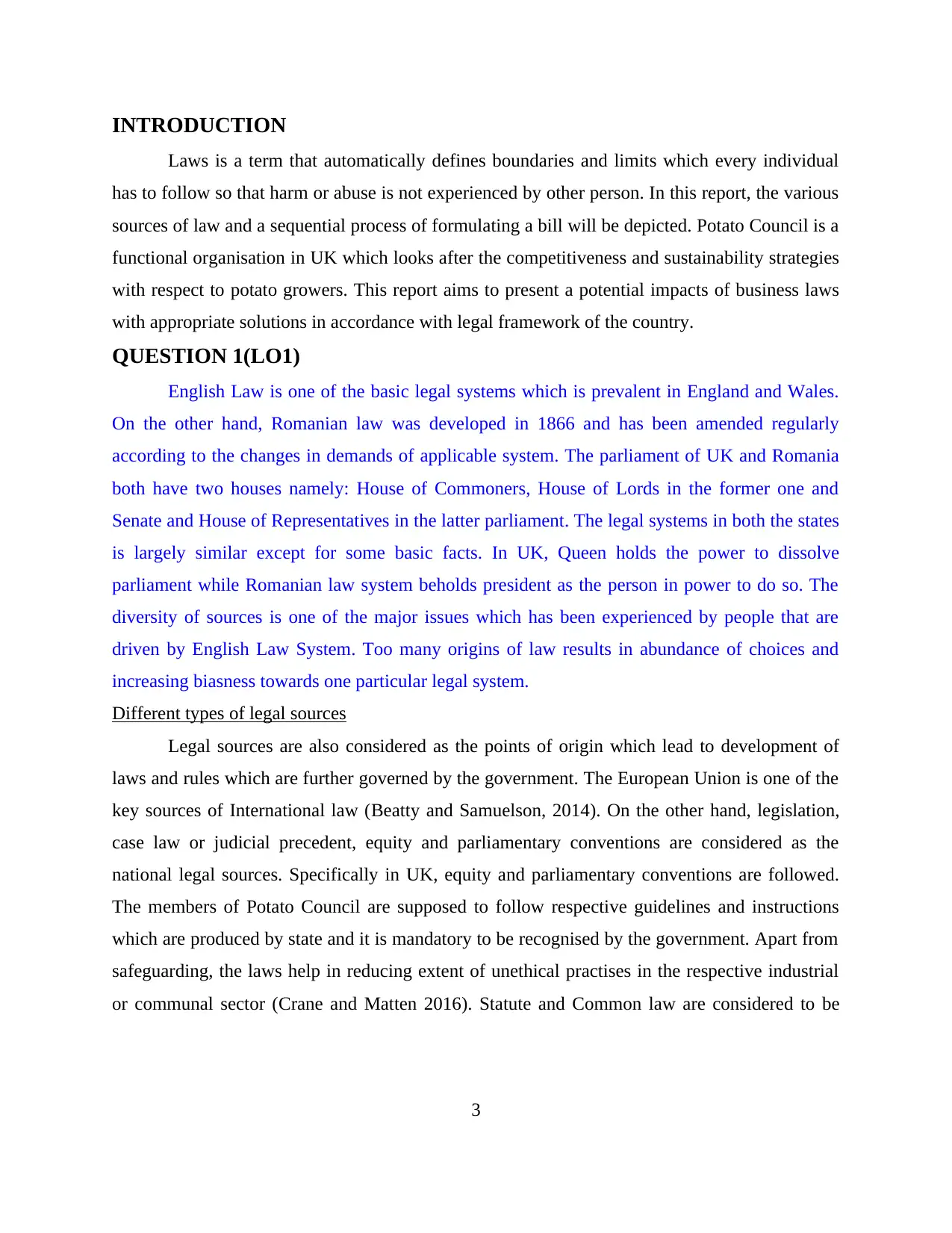
INTRODUCTION
Laws is a term that automatically defines boundaries and limits which every individual
has to follow so that harm or abuse is not experienced by other person. In this report, the various
sources of law and a sequential process of formulating a bill will be depicted. Potato Council is a
functional organisation in UK which looks after the competitiveness and sustainability strategies
with respect to potato growers. This report aims to present a potential impacts of business laws
with appropriate solutions in accordance with legal framework of the country.
QUESTION 1(LO1)
English Law is one of the basic legal systems which is prevalent in England and Wales.
On the other hand, Romanian law was developed in 1866 and has been amended regularly
according to the changes in demands of applicable system. The parliament of UK and Romania
both have two houses namely: House of Commoners, House of Lords in the former one and
Senate and House of Representatives in the latter parliament. The legal systems in both the states
is largely similar except for some basic facts. In UK, Queen holds the power to dissolve
parliament while Romanian law system beholds president as the person in power to do so. The
diversity of sources is one of the major issues which has been experienced by people that are
driven by English Law System. Too many origins of law results in abundance of choices and
increasing biasness towards one particular legal system.
Different types of legal sources
Legal sources are also considered as the points of origin which lead to development of
laws and rules which are further governed by the government. The European Union is one of the
key sources of International law (Beatty and Samuelson, 2014). On the other hand, legislation,
case law or judicial precedent, equity and parliamentary conventions are considered as the
national legal sources. Specifically in UK, equity and parliamentary conventions are followed.
The members of Potato Council are supposed to follow respective guidelines and instructions
which are produced by state and it is mandatory to be recognised by the government. Apart from
safeguarding, the laws help in reducing extent of unethical practises in the respective industrial
or communal sector (Crane and Matten 2016). Statute and Common law are considered to be
3
Laws is a term that automatically defines boundaries and limits which every individual
has to follow so that harm or abuse is not experienced by other person. In this report, the various
sources of law and a sequential process of formulating a bill will be depicted. Potato Council is a
functional organisation in UK which looks after the competitiveness and sustainability strategies
with respect to potato growers. This report aims to present a potential impacts of business laws
with appropriate solutions in accordance with legal framework of the country.
QUESTION 1(LO1)
English Law is one of the basic legal systems which is prevalent in England and Wales.
On the other hand, Romanian law was developed in 1866 and has been amended regularly
according to the changes in demands of applicable system. The parliament of UK and Romania
both have two houses namely: House of Commoners, House of Lords in the former one and
Senate and House of Representatives in the latter parliament. The legal systems in both the states
is largely similar except for some basic facts. In UK, Queen holds the power to dissolve
parliament while Romanian law system beholds president as the person in power to do so. The
diversity of sources is one of the major issues which has been experienced by people that are
driven by English Law System. Too many origins of law results in abundance of choices and
increasing biasness towards one particular legal system.
Different types of legal sources
Legal sources are also considered as the points of origin which lead to development of
laws and rules which are further governed by the government. The European Union is one of the
key sources of International law (Beatty and Samuelson, 2014). On the other hand, legislation,
case law or judicial precedent, equity and parliamentary conventions are considered as the
national legal sources. Specifically in UK, equity and parliamentary conventions are followed.
The members of Potato Council are supposed to follow respective guidelines and instructions
which are produced by state and it is mandatory to be recognised by the government. Apart from
safeguarding, the laws help in reducing extent of unethical practises in the respective industrial
or communal sector (Crane and Matten 2016). Statute and Common law are considered to be
3
⊘ This is a preview!⊘
Do you want full access?
Subscribe today to unlock all pages.

Trusted by 1+ million students worldwide
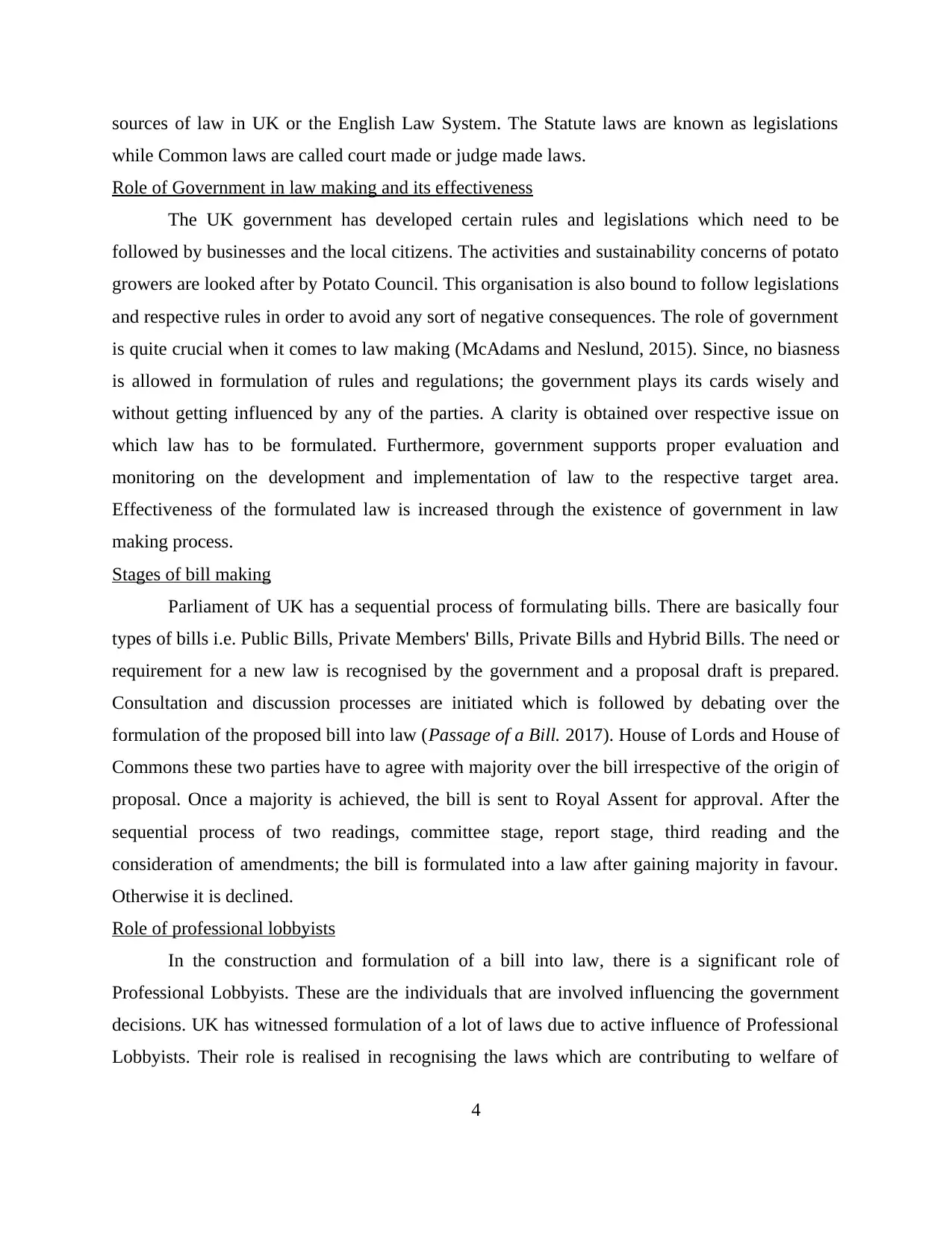
sources of law in UK or the English Law System. The Statute laws are known as legislations
while Common laws are called court made or judge made laws.
Role of Government in law making and its effectiveness
The UK government has developed certain rules and legislations which need to be
followed by businesses and the local citizens. The activities and sustainability concerns of potato
growers are looked after by Potato Council. This organisation is also bound to follow legislations
and respective rules in order to avoid any sort of negative consequences. The role of government
is quite crucial when it comes to law making (McAdams and Neslund, 2015). Since, no biasness
is allowed in formulation of rules and regulations; the government plays its cards wisely and
without getting influenced by any of the parties. A clarity is obtained over respective issue on
which law has to be formulated. Furthermore, government supports proper evaluation and
monitoring on the development and implementation of law to the respective target area.
Effectiveness of the formulated law is increased through the existence of government in law
making process.
Stages of bill making
Parliament of UK has a sequential process of formulating bills. There are basically four
types of bills i.e. Public Bills, Private Members' Bills, Private Bills and Hybrid Bills. The need or
requirement for a new law is recognised by the government and a proposal draft is prepared.
Consultation and discussion processes are initiated which is followed by debating over the
formulation of the proposed bill into law (Passage of a Bill. 2017). House of Lords and House of
Commons these two parties have to agree with majority over the bill irrespective of the origin of
proposal. Once a majority is achieved, the bill is sent to Royal Assent for approval. After the
sequential process of two readings, committee stage, report stage, third reading and the
consideration of amendments; the bill is formulated into a law after gaining majority in favour.
Otherwise it is declined.
Role of professional lobbyists
In the construction and formulation of a bill into law, there is a significant role of
Professional Lobbyists. These are the individuals that are involved influencing the government
decisions. UK has witnessed formulation of a lot of laws due to active influence of Professional
Lobbyists. Their role is realised in recognising the laws which are contributing to welfare of
4
while Common laws are called court made or judge made laws.
Role of Government in law making and its effectiveness
The UK government has developed certain rules and legislations which need to be
followed by businesses and the local citizens. The activities and sustainability concerns of potato
growers are looked after by Potato Council. This organisation is also bound to follow legislations
and respective rules in order to avoid any sort of negative consequences. The role of government
is quite crucial when it comes to law making (McAdams and Neslund, 2015). Since, no biasness
is allowed in formulation of rules and regulations; the government plays its cards wisely and
without getting influenced by any of the parties. A clarity is obtained over respective issue on
which law has to be formulated. Furthermore, government supports proper evaluation and
monitoring on the development and implementation of law to the respective target area.
Effectiveness of the formulated law is increased through the existence of government in law
making process.
Stages of bill making
Parliament of UK has a sequential process of formulating bills. There are basically four
types of bills i.e. Public Bills, Private Members' Bills, Private Bills and Hybrid Bills. The need or
requirement for a new law is recognised by the government and a proposal draft is prepared.
Consultation and discussion processes are initiated which is followed by debating over the
formulation of the proposed bill into law (Passage of a Bill. 2017). House of Lords and House of
Commons these two parties have to agree with majority over the bill irrespective of the origin of
proposal. Once a majority is achieved, the bill is sent to Royal Assent for approval. After the
sequential process of two readings, committee stage, report stage, third reading and the
consideration of amendments; the bill is formulated into a law after gaining majority in favour.
Otherwise it is declined.
Role of professional lobbyists
In the construction and formulation of a bill into law, there is a significant role of
Professional Lobbyists. These are the individuals that are involved influencing the government
decisions. UK has witnessed formulation of a lot of laws due to active influence of Professional
Lobbyists. Their role is realised in recognising the laws which are contributing to welfare of
4
Paraphrase This Document
Need a fresh take? Get an instant paraphrase of this document with our AI Paraphraser
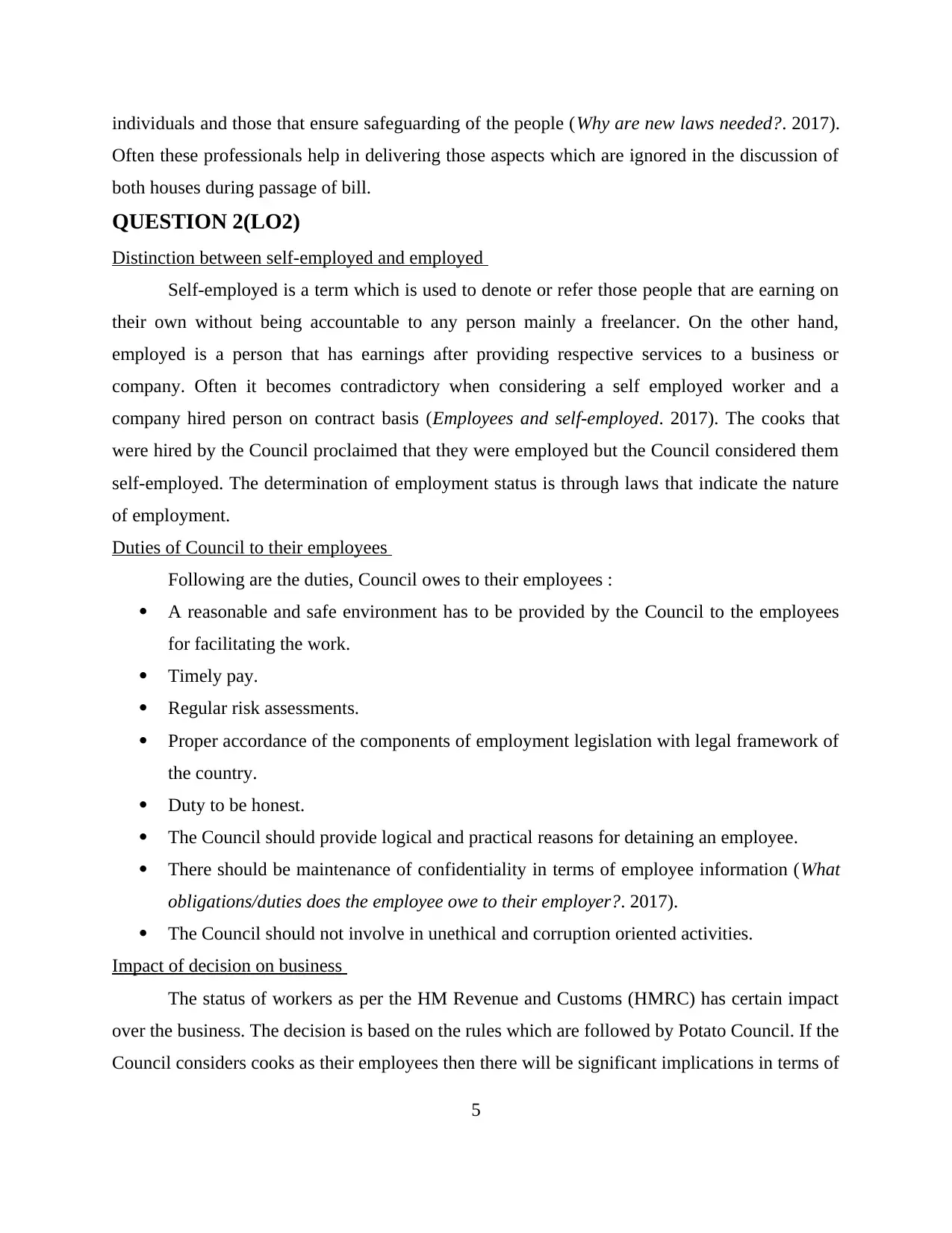
individuals and those that ensure safeguarding of the people (Why are new laws needed?. 2017).
Often these professionals help in delivering those aspects which are ignored in the discussion of
both houses during passage of bill.
QUESTION 2(LO2)
Distinction between self-employed and employed
Self-employed is a term which is used to denote or refer those people that are earning on
their own without being accountable to any person mainly a freelancer. On the other hand,
employed is a person that has earnings after providing respective services to a business or
company. Often it becomes contradictory when considering a self employed worker and a
company hired person on contract basis (Employees and self-employed. 2017). The cooks that
were hired by the Council proclaimed that they were employed but the Council considered them
self-employed. The determination of employment status is through laws that indicate the nature
of employment.
Duties of Council to their employees
Following are the duties, Council owes to their employees :
A reasonable and safe environment has to be provided by the Council to the employees
for facilitating the work.
Timely pay.
Regular risk assessments.
Proper accordance of the components of employment legislation with legal framework of
the country.
Duty to be honest.
The Council should provide logical and practical reasons for detaining an employee.
There should be maintenance of confidentiality in terms of employee information (What
obligations/duties does the employee owe to their employer?. 2017).
The Council should not involve in unethical and corruption oriented activities.
Impact of decision on business
The status of workers as per the HM Revenue and Customs (HMRC) has certain impact
over the business. The decision is based on the rules which are followed by Potato Council. If the
Council considers cooks as their employees then there will be significant implications in terms of
5
Often these professionals help in delivering those aspects which are ignored in the discussion of
both houses during passage of bill.
QUESTION 2(LO2)
Distinction between self-employed and employed
Self-employed is a term which is used to denote or refer those people that are earning on
their own without being accountable to any person mainly a freelancer. On the other hand,
employed is a person that has earnings after providing respective services to a business or
company. Often it becomes contradictory when considering a self employed worker and a
company hired person on contract basis (Employees and self-employed. 2017). The cooks that
were hired by the Council proclaimed that they were employed but the Council considered them
self-employed. The determination of employment status is through laws that indicate the nature
of employment.
Duties of Council to their employees
Following are the duties, Council owes to their employees :
A reasonable and safe environment has to be provided by the Council to the employees
for facilitating the work.
Timely pay.
Regular risk assessments.
Proper accordance of the components of employment legislation with legal framework of
the country.
Duty to be honest.
The Council should provide logical and practical reasons for detaining an employee.
There should be maintenance of confidentiality in terms of employee information (What
obligations/duties does the employee owe to their employer?. 2017).
The Council should not involve in unethical and corruption oriented activities.
Impact of decision on business
The status of workers as per the HM Revenue and Customs (HMRC) has certain impact
over the business. The decision is based on the rules which are followed by Potato Council. If the
Council considers cooks as their employees then there will be significant implications in terms of
5
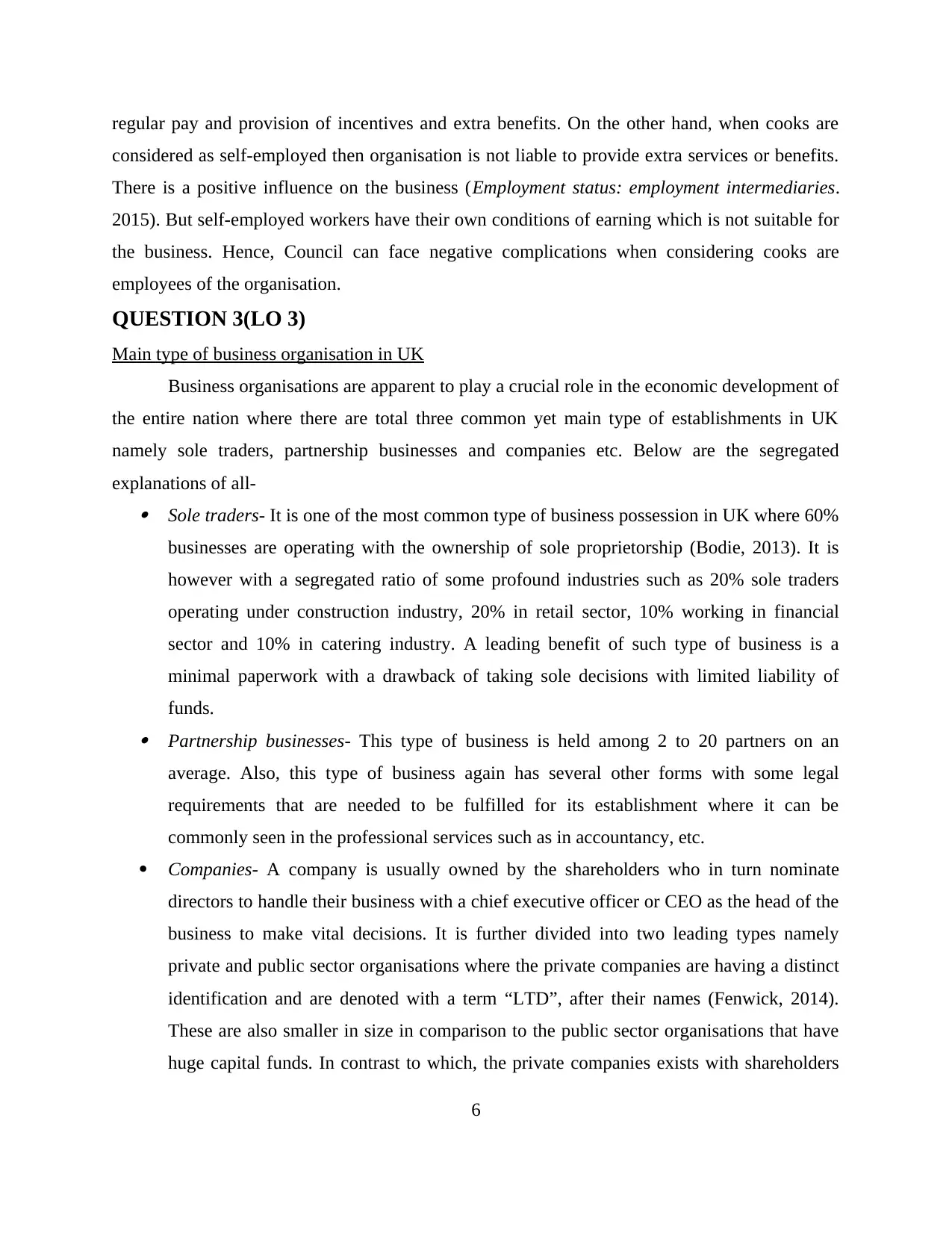
regular pay and provision of incentives and extra benefits. On the other hand, when cooks are
considered as self-employed then organisation is not liable to provide extra services or benefits.
There is a positive influence on the business (Employment status: employment intermediaries.
2015). But self-employed workers have their own conditions of earning which is not suitable for
the business. Hence, Council can face negative complications when considering cooks are
employees of the organisation.
QUESTION 3(LO 3)
Main type of business organisation in UK
Business organisations are apparent to play a crucial role in the economic development of
the entire nation where there are total three common yet main type of establishments in UK
namely sole traders, partnership businesses and companies etc. Below are the segregated
explanations of all- Sole traders- It is one of the most common type of business possession in UK where 60%
businesses are operating with the ownership of sole proprietorship (Bodie, 2013). It is
however with a segregated ratio of some profound industries such as 20% sole traders
operating under construction industry, 20% in retail sector, 10% working in financial
sector and 10% in catering industry. A leading benefit of such type of business is a
minimal paperwork with a drawback of taking sole decisions with limited liability of
funds. Partnership businesses- This type of business is held among 2 to 20 partners on an
average. Also, this type of business again has several other forms with some legal
requirements that are needed to be fulfilled for its establishment where it can be
commonly seen in the professional services such as in accountancy, etc.
Companies- A company is usually owned by the shareholders who in turn nominate
directors to handle their business with a chief executive officer or CEO as the head of the
business to make vital decisions. It is further divided into two leading types namely
private and public sector organisations where the private companies are having a distinct
identification and are denoted with a term “LTD”, after their names (Fenwick, 2014).
These are also smaller in size in comparison to the public sector organisations that have
huge capital funds. In contrast to which, the private companies exists with shareholders
6
considered as self-employed then organisation is not liable to provide extra services or benefits.
There is a positive influence on the business (Employment status: employment intermediaries.
2015). But self-employed workers have their own conditions of earning which is not suitable for
the business. Hence, Council can face negative complications when considering cooks are
employees of the organisation.
QUESTION 3(LO 3)
Main type of business organisation in UK
Business organisations are apparent to play a crucial role in the economic development of
the entire nation where there are total three common yet main type of establishments in UK
namely sole traders, partnership businesses and companies etc. Below are the segregated
explanations of all- Sole traders- It is one of the most common type of business possession in UK where 60%
businesses are operating with the ownership of sole proprietorship (Bodie, 2013). It is
however with a segregated ratio of some profound industries such as 20% sole traders
operating under construction industry, 20% in retail sector, 10% working in financial
sector and 10% in catering industry. A leading benefit of such type of business is a
minimal paperwork with a drawback of taking sole decisions with limited liability of
funds. Partnership businesses- This type of business is held among 2 to 20 partners on an
average. Also, this type of business again has several other forms with some legal
requirements that are needed to be fulfilled for its establishment where it can be
commonly seen in the professional services such as in accountancy, etc.
Companies- A company is usually owned by the shareholders who in turn nominate
directors to handle their business with a chief executive officer or CEO as the head of the
business to make vital decisions. It is further divided into two leading types namely
private and public sector organisations where the private companies are having a distinct
identification and are denoted with a term “LTD”, after their names (Fenwick, 2014).
These are also smaller in size in comparison to the public sector organisations that have
huge capital funds. In contrast to which, the private companies exists with shareholders
6
⊘ This is a preview!⊘
Do you want full access?
Subscribe today to unlock all pages.

Trusted by 1+ million students worldwide
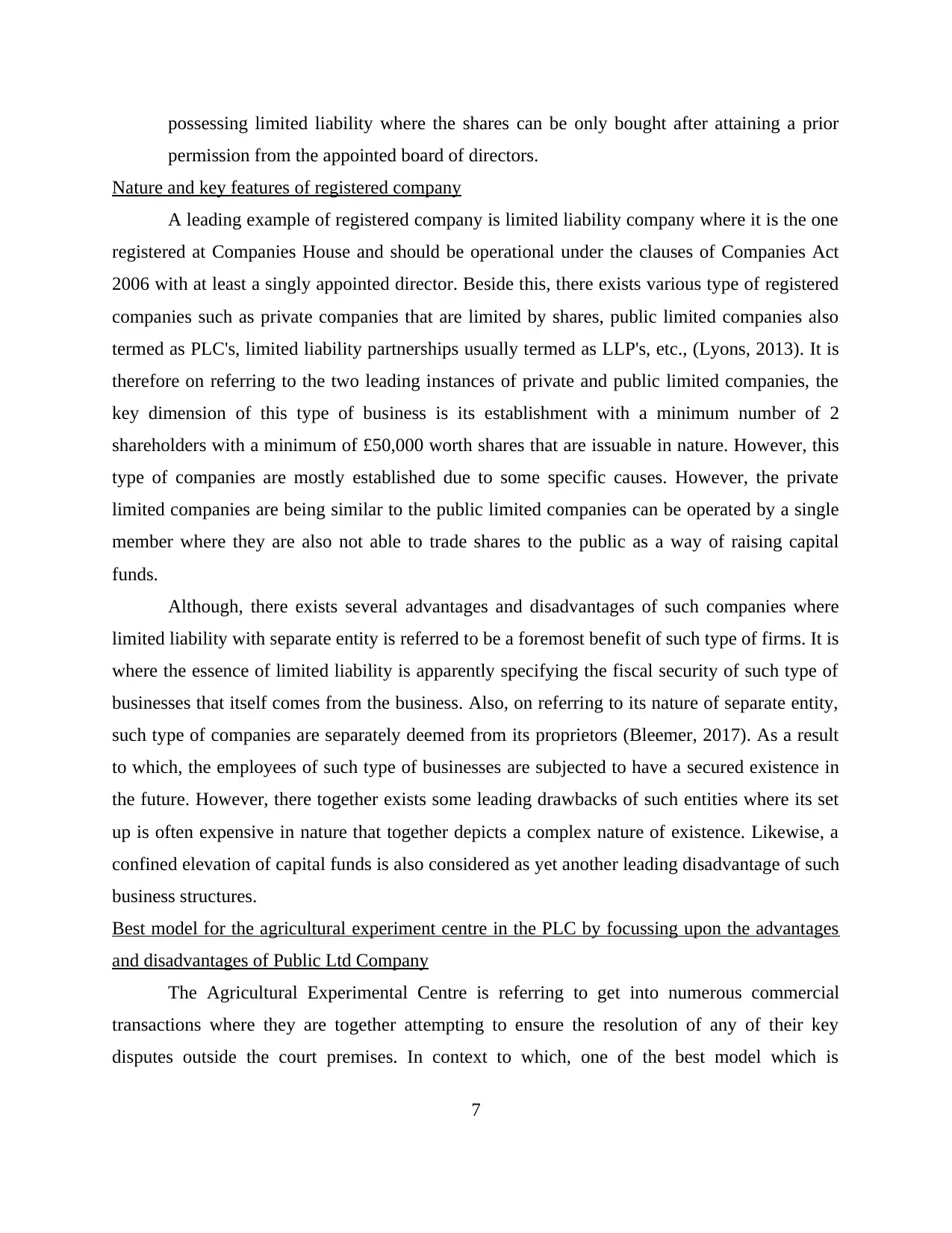
possessing limited liability where the shares can be only bought after attaining a prior
permission from the appointed board of directors.
Nature and key features of registered company
A leading example of registered company is limited liability company where it is the one
registered at Companies House and should be operational under the clauses of Companies Act
2006 with at least a singly appointed director. Beside this, there exists various type of registered
companies such as private companies that are limited by shares, public limited companies also
termed as PLC's, limited liability partnerships usually termed as LLP's, etc., (Lyons, 2013). It is
therefore on referring to the two leading instances of private and public limited companies, the
key dimension of this type of business is its establishment with a minimum number of 2
shareholders with a minimum of £50,000 worth shares that are issuable in nature. However, this
type of companies are mostly established due to some specific causes. However, the private
limited companies are being similar to the public limited companies can be operated by a single
member where they are also not able to trade shares to the public as a way of raising capital
funds.
Although, there exists several advantages and disadvantages of such companies where
limited liability with separate entity is referred to be a foremost benefit of such type of firms. It is
where the essence of limited liability is apparently specifying the fiscal security of such type of
businesses that itself comes from the business. Also, on referring to its nature of separate entity,
such type of companies are separately deemed from its proprietors (Bleemer, 2017). As a result
to which, the employees of such type of businesses are subjected to have a secured existence in
the future. However, there together exists some leading drawbacks of such entities where its set
up is often expensive in nature that together depicts a complex nature of existence. Likewise, a
confined elevation of capital funds is also considered as yet another leading disadvantage of such
business structures.
Best model for the agricultural experiment centre in the PLC by focussing upon the advantages
and disadvantages of Public Ltd Company
The Agricultural Experimental Centre is referring to get into numerous commercial
transactions where they are together attempting to ensure the resolution of any of their key
disputes outside the court premises. In context to which, one of the best model which is
7
permission from the appointed board of directors.
Nature and key features of registered company
A leading example of registered company is limited liability company where it is the one
registered at Companies House and should be operational under the clauses of Companies Act
2006 with at least a singly appointed director. Beside this, there exists various type of registered
companies such as private companies that are limited by shares, public limited companies also
termed as PLC's, limited liability partnerships usually termed as LLP's, etc., (Lyons, 2013). It is
therefore on referring to the two leading instances of private and public limited companies, the
key dimension of this type of business is its establishment with a minimum number of 2
shareholders with a minimum of £50,000 worth shares that are issuable in nature. However, this
type of companies are mostly established due to some specific causes. However, the private
limited companies are being similar to the public limited companies can be operated by a single
member where they are also not able to trade shares to the public as a way of raising capital
funds.
Although, there exists several advantages and disadvantages of such companies where
limited liability with separate entity is referred to be a foremost benefit of such type of firms. It is
where the essence of limited liability is apparently specifying the fiscal security of such type of
businesses that itself comes from the business. Also, on referring to its nature of separate entity,
such type of companies are separately deemed from its proprietors (Bleemer, 2017). As a result
to which, the employees of such type of businesses are subjected to have a secured existence in
the future. However, there together exists some leading drawbacks of such entities where its set
up is often expensive in nature that together depicts a complex nature of existence. Likewise, a
confined elevation of capital funds is also considered as yet another leading disadvantage of such
business structures.
Best model for the agricultural experiment centre in the PLC by focussing upon the advantages
and disadvantages of Public Ltd Company
The Agricultural Experimental Centre is referring to get into numerous commercial
transactions where they are together attempting to ensure the resolution of any of their key
disputes outside the court premises. In context to which, one of the best model which is
7
Paraphrase This Document
Need a fresh take? Get an instant paraphrase of this document with our AI Paraphraser
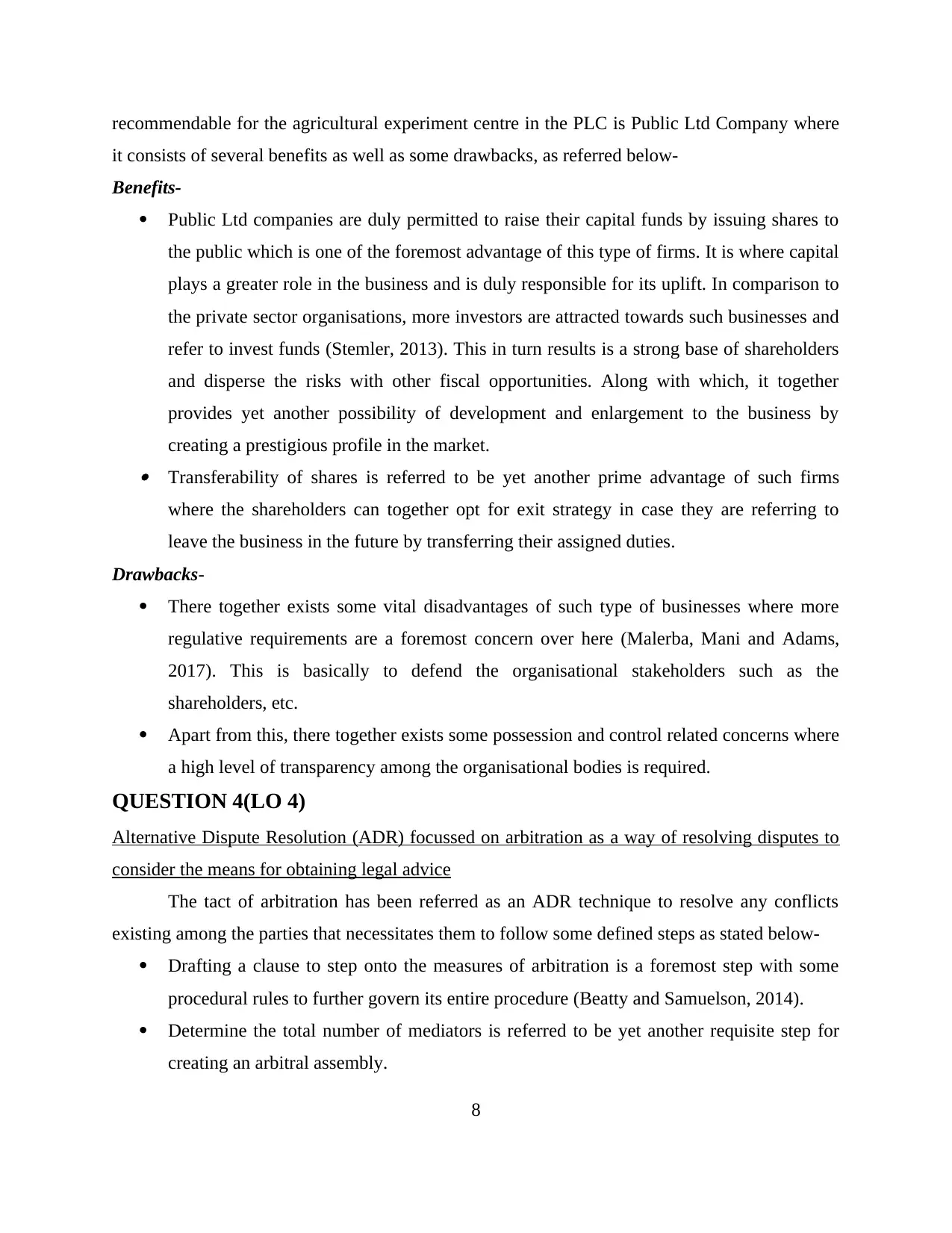
recommendable for the agricultural experiment centre in the PLC is Public Ltd Company where
it consists of several benefits as well as some drawbacks, as referred below-
Benefits-
Public Ltd companies are duly permitted to raise their capital funds by issuing shares to
the public which is one of the foremost advantage of this type of firms. It is where capital
plays a greater role in the business and is duly responsible for its uplift. In comparison to
the private sector organisations, more investors are attracted towards such businesses and
refer to invest funds (Stemler, 2013). This in turn results is a strong base of shareholders
and disperse the risks with other fiscal opportunities. Along with which, it together
provides yet another possibility of development and enlargement to the business by
creating a prestigious profile in the market. Transferability of shares is referred to be yet another prime advantage of such firms
where the shareholders can together opt for exit strategy in case they are referring to
leave the business in the future by transferring their assigned duties.
Drawbacks-
There together exists some vital disadvantages of such type of businesses where more
regulative requirements are a foremost concern over here (Malerba, Mani and Adams,
2017). This is basically to defend the organisational stakeholders such as the
shareholders, etc.
Apart from this, there together exists some possession and control related concerns where
a high level of transparency among the organisational bodies is required.
QUESTION 4(LO 4)
Alternative Dispute Resolution (ADR) focussed on arbitration as a way of resolving disputes to
consider the means for obtaining legal advice
The tact of arbitration has been referred as an ADR technique to resolve any conflicts
existing among the parties that necessitates them to follow some defined steps as stated below-
Drafting a clause to step onto the measures of arbitration is a foremost step with some
procedural rules to further govern its entire procedure (Beatty and Samuelson, 2014).
Determine the total number of mediators is referred to be yet another requisite step for
creating an arbitral assembly.
8
it consists of several benefits as well as some drawbacks, as referred below-
Benefits-
Public Ltd companies are duly permitted to raise their capital funds by issuing shares to
the public which is one of the foremost advantage of this type of firms. It is where capital
plays a greater role in the business and is duly responsible for its uplift. In comparison to
the private sector organisations, more investors are attracted towards such businesses and
refer to invest funds (Stemler, 2013). This in turn results is a strong base of shareholders
and disperse the risks with other fiscal opportunities. Along with which, it together
provides yet another possibility of development and enlargement to the business by
creating a prestigious profile in the market. Transferability of shares is referred to be yet another prime advantage of such firms
where the shareholders can together opt for exit strategy in case they are referring to
leave the business in the future by transferring their assigned duties.
Drawbacks-
There together exists some vital disadvantages of such type of businesses where more
regulative requirements are a foremost concern over here (Malerba, Mani and Adams,
2017). This is basically to defend the organisational stakeholders such as the
shareholders, etc.
Apart from this, there together exists some possession and control related concerns where
a high level of transparency among the organisational bodies is required.
QUESTION 4(LO 4)
Alternative Dispute Resolution (ADR) focussed on arbitration as a way of resolving disputes to
consider the means for obtaining legal advice
The tact of arbitration has been referred as an ADR technique to resolve any conflicts
existing among the parties that necessitates them to follow some defined steps as stated below-
Drafting a clause to step onto the measures of arbitration is a foremost step with some
procedural rules to further govern its entire procedure (Beatty and Samuelson, 2014).
Determine the total number of mediators is referred to be yet another requisite step for
creating an arbitral assembly.
8
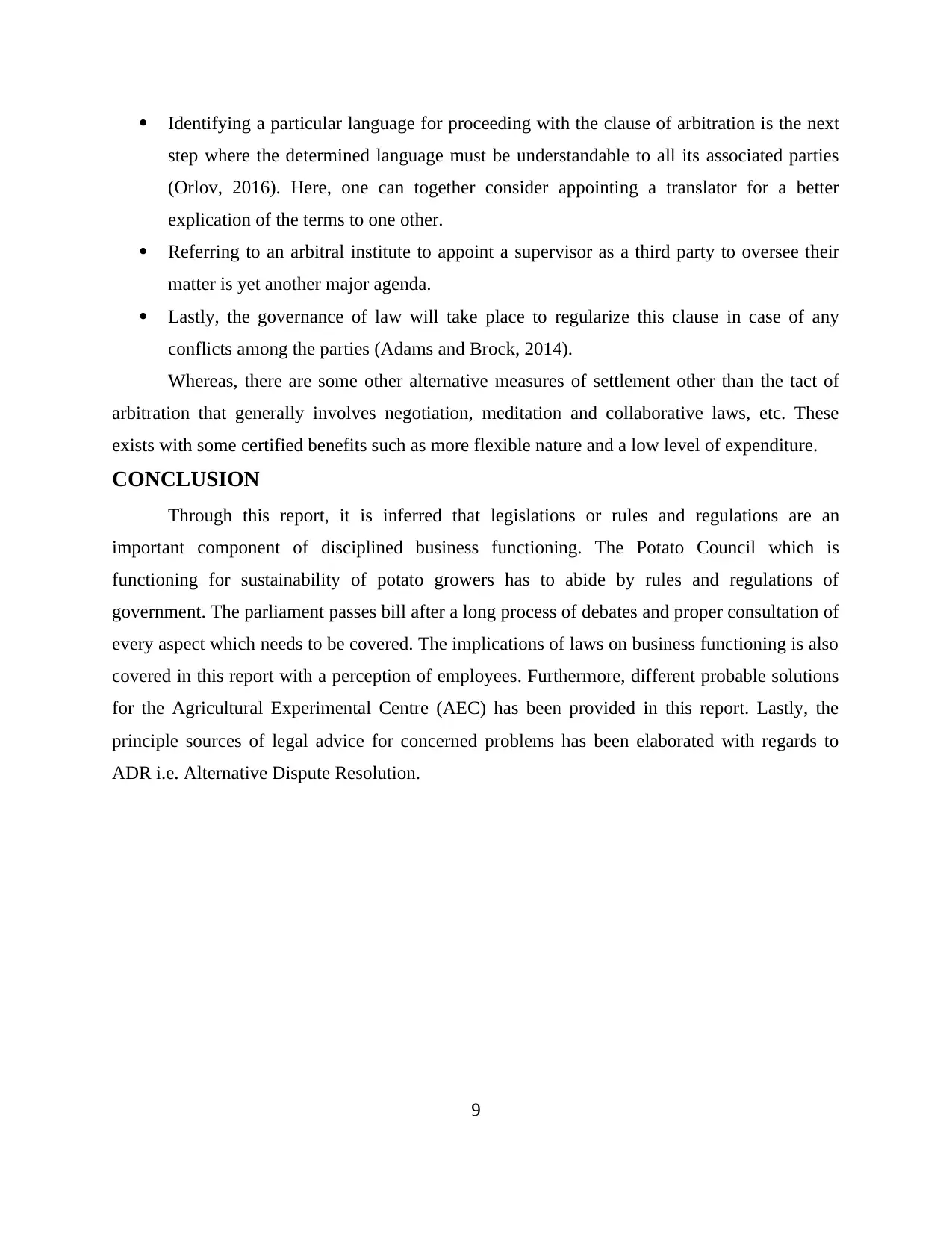
Identifying a particular language for proceeding with the clause of arbitration is the next
step where the determined language must be understandable to all its associated parties
(Orlov, 2016). Here, one can together consider appointing a translator for a better
explication of the terms to one other.
Referring to an arbitral institute to appoint a supervisor as a third party to oversee their
matter is yet another major agenda.
Lastly, the governance of law will take place to regularize this clause in case of any
conflicts among the parties (Adams and Brock, 2014).
Whereas, there are some other alternative measures of settlement other than the tact of
arbitration that generally involves negotiation, meditation and collaborative laws, etc. These
exists with some certified benefits such as more flexible nature and a low level of expenditure.
CONCLUSION
Through this report, it is inferred that legislations or rules and regulations are an
important component of disciplined business functioning. The Potato Council which is
functioning for sustainability of potato growers has to abide by rules and regulations of
government. The parliament passes bill after a long process of debates and proper consultation of
every aspect which needs to be covered. The implications of laws on business functioning is also
covered in this report with a perception of employees. Furthermore, different probable solutions
for the Agricultural Experimental Centre (AEC) has been provided in this report. Lastly, the
principle sources of legal advice for concerned problems has been elaborated with regards to
ADR i.e. Alternative Dispute Resolution.
9
step where the determined language must be understandable to all its associated parties
(Orlov, 2016). Here, one can together consider appointing a translator for a better
explication of the terms to one other.
Referring to an arbitral institute to appoint a supervisor as a third party to oversee their
matter is yet another major agenda.
Lastly, the governance of law will take place to regularize this clause in case of any
conflicts among the parties (Adams and Brock, 2014).
Whereas, there are some other alternative measures of settlement other than the tact of
arbitration that generally involves negotiation, meditation and collaborative laws, etc. These
exists with some certified benefits such as more flexible nature and a low level of expenditure.
CONCLUSION
Through this report, it is inferred that legislations or rules and regulations are an
important component of disciplined business functioning. The Potato Council which is
functioning for sustainability of potato growers has to abide by rules and regulations of
government. The parliament passes bill after a long process of debates and proper consultation of
every aspect which needs to be covered. The implications of laws on business functioning is also
covered in this report with a perception of employees. Furthermore, different probable solutions
for the Agricultural Experimental Centre (AEC) has been provided in this report. Lastly, the
principle sources of legal advice for concerned problems has been elaborated with regards to
ADR i.e. Alternative Dispute Resolution.
9
⊘ This is a preview!⊘
Do you want full access?
Subscribe today to unlock all pages.

Trusted by 1+ million students worldwide
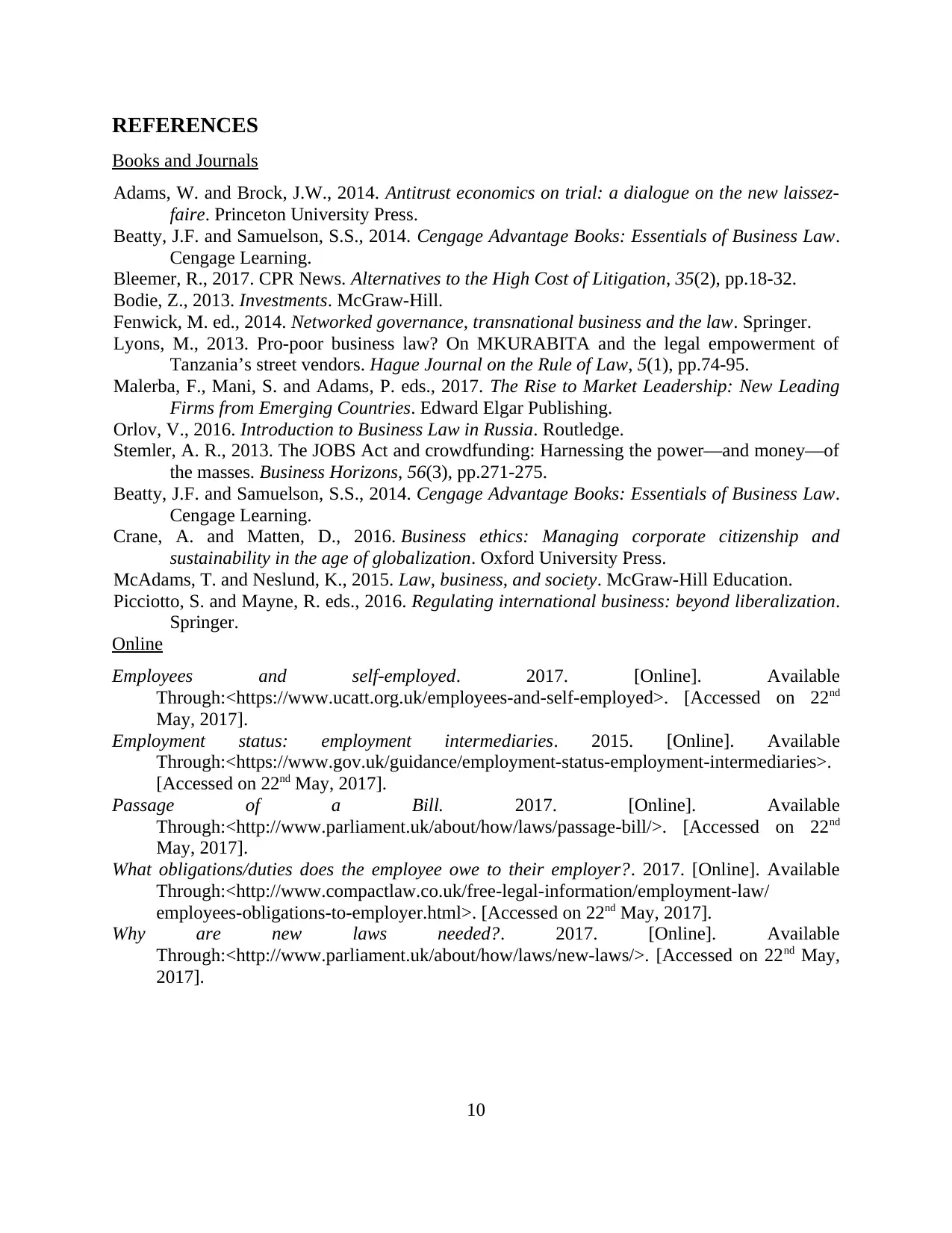
REFERENCES
Books and Journals
Adams, W. and Brock, J.W., 2014. Antitrust economics on trial: a dialogue on the new laissez-
faire. Princeton University Press.
Beatty, J.F. and Samuelson, S.S., 2014. Cengage Advantage Books: Essentials of Business Law.
Cengage Learning.
Bleemer, R., 2017. CPR News. Alternatives to the High Cost of Litigation, 35(2), pp.18-32.
Bodie, Z., 2013. Investments. McGraw-Hill.
Fenwick, M. ed., 2014. Networked governance, transnational business and the law. Springer.
Lyons, M., 2013. Pro-poor business law? On MKURABITA and the legal empowerment of
Tanzania’s street vendors. Hague Journal on the Rule of Law, 5(1), pp.74-95.
Malerba, F., Mani, S. and Adams, P. eds., 2017. The Rise to Market Leadership: New Leading
Firms from Emerging Countries. Edward Elgar Publishing.
Orlov, V., 2016. Introduction to Business Law in Russia. Routledge.
Stemler, A. R., 2013. The JOBS Act and crowdfunding: Harnessing the power—and money—of
the masses. Business Horizons, 56(3), pp.271-275.
Beatty, J.F. and Samuelson, S.S., 2014. Cengage Advantage Books: Essentials of Business Law.
Cengage Learning.
Crane, A. and Matten, D., 2016. Business ethics: Managing corporate citizenship and
sustainability in the age of globalization. Oxford University Press.
McAdams, T. and Neslund, K., 2015. Law, business, and society. McGraw-Hill Education.
Picciotto, S. and Mayne, R. eds., 2016. Regulating international business: beyond liberalization.
Springer.
Online
Employees and self-employed. 2017. [Online]. Available
Through:<https://www.ucatt.org.uk/employees-and-self-employed>. [Accessed on 22nd
May, 2017].
Employment status: employment intermediaries. 2015. [Online]. Available
Through:<https://www.gov.uk/guidance/employment-status-employment-intermediaries>.
[Accessed on 22nd May, 2017].
Passage of a Bill. 2017. [Online]. Available
Through:<http://www.parliament.uk/about/how/laws/passage-bill/>. [Accessed on 22nd
May, 2017].
What obligations/duties does the employee owe to their employer?. 2017. [Online]. Available
Through:<http://www.compactlaw.co.uk/free-legal-information/employment-law/
employees-obligations-to-employer.html>. [Accessed on 22nd May, 2017].
Why are new laws needed?. 2017. [Online]. Available
Through:<http://www.parliament.uk/about/how/laws/new-laws/>. [Accessed on 22nd May,
2017].
10
Books and Journals
Adams, W. and Brock, J.W., 2014. Antitrust economics on trial: a dialogue on the new laissez-
faire. Princeton University Press.
Beatty, J.F. and Samuelson, S.S., 2014. Cengage Advantage Books: Essentials of Business Law.
Cengage Learning.
Bleemer, R., 2017. CPR News. Alternatives to the High Cost of Litigation, 35(2), pp.18-32.
Bodie, Z., 2013. Investments. McGraw-Hill.
Fenwick, M. ed., 2014. Networked governance, transnational business and the law. Springer.
Lyons, M., 2013. Pro-poor business law? On MKURABITA and the legal empowerment of
Tanzania’s street vendors. Hague Journal on the Rule of Law, 5(1), pp.74-95.
Malerba, F., Mani, S. and Adams, P. eds., 2017. The Rise to Market Leadership: New Leading
Firms from Emerging Countries. Edward Elgar Publishing.
Orlov, V., 2016. Introduction to Business Law in Russia. Routledge.
Stemler, A. R., 2013. The JOBS Act and crowdfunding: Harnessing the power—and money—of
the masses. Business Horizons, 56(3), pp.271-275.
Beatty, J.F. and Samuelson, S.S., 2014. Cengage Advantage Books: Essentials of Business Law.
Cengage Learning.
Crane, A. and Matten, D., 2016. Business ethics: Managing corporate citizenship and
sustainability in the age of globalization. Oxford University Press.
McAdams, T. and Neslund, K., 2015. Law, business, and society. McGraw-Hill Education.
Picciotto, S. and Mayne, R. eds., 2016. Regulating international business: beyond liberalization.
Springer.
Online
Employees and self-employed. 2017. [Online]. Available
Through:<https://www.ucatt.org.uk/employees-and-self-employed>. [Accessed on 22nd
May, 2017].
Employment status: employment intermediaries. 2015. [Online]. Available
Through:<https://www.gov.uk/guidance/employment-status-employment-intermediaries>.
[Accessed on 22nd May, 2017].
Passage of a Bill. 2017. [Online]. Available
Through:<http://www.parliament.uk/about/how/laws/passage-bill/>. [Accessed on 22nd
May, 2017].
What obligations/duties does the employee owe to their employer?. 2017. [Online]. Available
Through:<http://www.compactlaw.co.uk/free-legal-information/employment-law/
employees-obligations-to-employer.html>. [Accessed on 22nd May, 2017].
Why are new laws needed?. 2017. [Online]. Available
Through:<http://www.parliament.uk/about/how/laws/new-laws/>. [Accessed on 22nd May,
2017].
10
Paraphrase This Document
Need a fresh take? Get an instant paraphrase of this document with our AI Paraphraser

11
1 out of 11
Related Documents
Your All-in-One AI-Powered Toolkit for Academic Success.
+13062052269
info@desklib.com
Available 24*7 on WhatsApp / Email
![[object Object]](/_next/static/media/star-bottom.7253800d.svg)
Unlock your academic potential
Copyright © 2020–2025 A2Z Services. All Rights Reserved. Developed and managed by ZUCOL.





